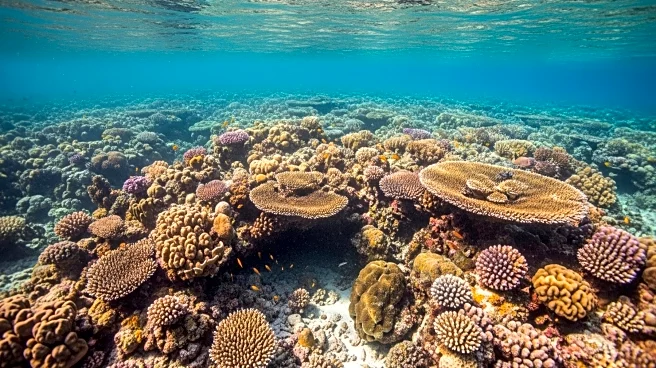What's Happening?
Recent record-breaking ocean temperatures have led to widespread bleaching and death among warm-water corals globally, marking the first climate tipping point for Earth's ecosystems. According to scientists, this collapse poses significant human health and security hazards that governments are currently unprepared to address. Warm-water coral reefs, which support up to one-third of all known marine biodiversity, are crucial for food, coastal protection, and income for up to a billion people worldwide. The bleaching event, triggered by high water temperatures, has affected over 80% of the world's corals, leaving them vulnerable to disease and potentially leading to their extinction. The Global Tipping Points Report 2025, compiled by 160 scientists, highlights that warm-water corals are the first Earth system to cross into their tipping point, facing an unprecedented crisis.
Why It's Important?
The degradation of coral reefs has far-reaching implications for marine biodiversity and human communities reliant on these ecosystems. Coral reefs contribute approximately $9.9 trillion annually in goods and services worldwide, underscoring their economic significance. The loss of coral reefs could lead to a decline in marine biodiversity, affecting food security and livelihoods for millions. Additionally, the collapse of coral ecosystems could exacerbate coastal erosion and reduce natural protection against storms and rising sea levels. The situation highlights the urgent need for global action to reduce greenhouse gas emissions and mitigate climate change impacts, as the survival of coral reefs is contingent on lowering global temperatures.
What's Next?
Efforts to save coral reefs from extinction hinge on reducing global average temperatures to 1.2°C above pre-industrial levels. Scientists emphasize the importance of rapid adoption of cleaner technologies, such as renewable energy and electric vehicles, to achieve necessary emissions cuts. The upcoming COP30 summit in Brazil presents an opportunity for world leaders to accelerate emissions reductions and minimize the duration of temperatures above 1.5°C. Immediate and unprecedented action from policymakers worldwide is crucial to prevent further tipping points in Earth's systems, which could have devastating consequences for both people and nature.
Beyond the Headlines
The coral reef crisis underscores the broader challenges of climate change, including the potential decline of the Amazon rainforest, melting polar ice sheets, and the collapse of the AMOC ocean current. These events could occur at warming levels below 2°C, highlighting the uncertainty and urgency of addressing climate tipping points. Positive tipping points, such as the growth of renewable energy, offer hope for mitigating risks and achieving emissions reductions. The situation calls for a reevaluation of global climate policies and increased investment in sustainable technologies to safeguard ecosystems and human communities.










